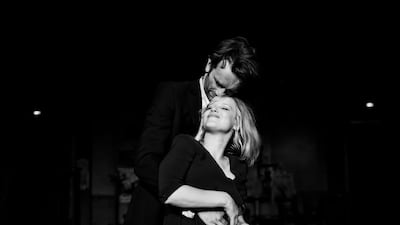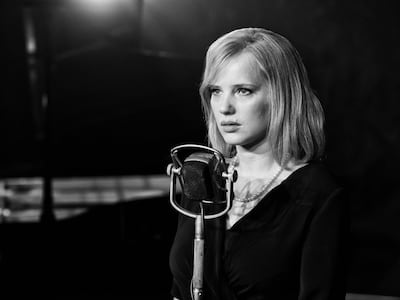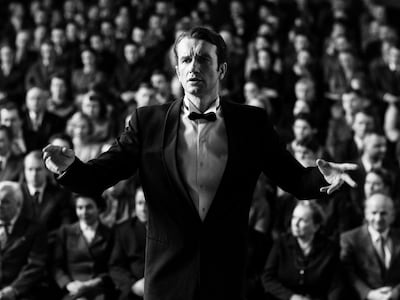How do you follow up a critically acclaimed movie that has won an Oscar? That was the conundrum facing Polish director Pawel Pawlikowski after his extraordinary Ida took the Best Foreign Language Film Oscar in 2015.
"It would have been easier if I'd done another film in English," says the director, whose 2004 hit My Summer of Love launched British actress Emily Blunt's career. "Because you make life difficult for yourself in terms of obtaining financing when you make another film in black and white using Polish actors without great international renown."
But the struggle to get Cold War made is definitely worth it. Pawlikowski won Best Director at Cannes this year for his love story that is inspired by the up-and-down relationship between his own parents.
The main characters in his latest film are named Wiktor and Zula after his own mother and father. In the part of Zula is Joanna Kulig, who played the singer in Ida. Tomasz Kot plays Wiktor, and says: "I think the link to Pawel's parents is a really deep metaphor. He may have mentioned his father four times in rehearsals and there was only one occasion on set."
That’s because the director sees the film as a fictionalised version of his parents’ story. He’s adapted his family history and created a love story over the course of 15 years – jumping from the Polish countryside to Berlin, Yugoslavia and Paris.
“The big stuff that helped me invent the story was about my parents,” says the director. “But I thought I can’t just tell a story about my parents: it’s too messy, it’s too convoluted and there are too many twists and turns. So I had to simplify their story and I had to give them some kind of thing that brings them together and feels really strong and necessary, so music was that.”
Throughout his directing career, which started with him making documentary films for the BBC, the 61-year-old director has used music to help him work: "When I conceive stories and scenes, I very often try and recall a song that is familiar, or that I associate with a given scene, and sometimes it is something relevant to that period or that is played at that time."
In Cold War, the incredible soundtrack runs the gamut from traditional Polish folk songs such as The Mazowsze folk ensemble's Two Hearts, to George Gershwin's I Love You Porgy and also free jazz played in Paris clubs in the late 1950s.
"I decided to make music one of the key characters – the third character in a way," explains the director. "Wictor and Zula are musicians and meet because of this folk ensemble, so music makes them come together, which was also a very useful dramatic device, as we could then have the music express and illustrate the different stages in their relationship. That gave me a license to play with music much more and really make it part of the story."
Cold War opens in a snowy winter in 1949, when a communist music programme is sweeping through Eastern Europe. A group of young rural musicians are told to audition for a state-endorsed traditional folk ensemble (inspired by the real-life Mazowsze troupe), which is about to embark on a tour of the Eastern Bloc.
Communist state officials have developed the opinion that music will change the national mood in the aftermath of the Second World War, because hearing traditional folk songs that talk up national sovereignty and history will be a healing mechanism for Poles trying to grapple with the trauma and fallout of Nazi rule. The snowy landscape highlights that although the Germans have left, the winter mood remains.
At the audition, musical theatre director Wictor, a refined upper-class bachelor meets working class Zula, who sings a song she’s memorised from television, rather than a traditional folk song. Instead of ruining her audition, Wictor is immediately smitten by her gusto. But this is not another story from the casting couch, as the director explains, “He’s quite a sensitive shy guy and she’s quite feisty and fights him back. So she’s not a victim and he’s not a predator.”
The obstacles of life prevent them from having a traditional relationship. Wiktor doesn’t want to compromise his art for political purposes and Julia wants to sing. “The film is really quite fragmented,” admits Pawlikowski. “It jumps two or three years at a time, but it is all held together by this couple.”
The director adds: “I think it’s a very classical story of East European fate. Having to deal with a totalitarian regime and then having to deal with exile.”
The resulting film is melancholic and beautiful. Happy and sad. Romantic and cynical. Kot says: "It's difficult to define exactly what this film is, because in the story we have a tragedy and also a love story. It's a very universal tale, but I was still amazed in Cannes when the response was so ecstatic. I thought wow, Pawel is really incredible, he makes a black-and-white film in Polish that everyone loves."
Cold War is showing at Cinema Akil in Dubai until November 2
______________
Read more
WATCH: Netflix looks to Oscars with new Sandra Bullock horror flick 'Bird Box'
Producer Malek Akkad on getting his chance to remake the horror film 'Halloween'
She was truly brave but the establishment let Nadia Murad down




